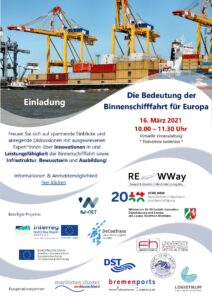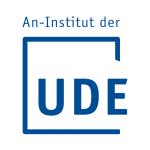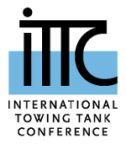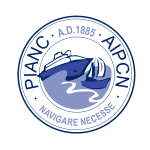
Inland waterway transport is part of an efficient and resource-saving transport system – this is also how the European Commission describes it in its White Paper on Transport. But how can inland waterway transport be further modernized, made permanently powerful and more visible to shippers and decision-makers? These were the questions that the Maritime Cluster of Northern Germany (MCN) invited the Development Centre for Ship Technology and Transport Systems (DST), the University of Applied Sciences Upper Austria (FHOÖ), bremenports, PIANC Germany, renowned experts and more than 80 participants from science, politics and industry for to discuss „The importance of inland navigation for Europe“ on March 16.
After introductory words by the Chairman of the MCN, Knut Gerdes, who once again emphasized the need for targeted cooperation between the maritime sector in order to make itself fit for the future, Herfried Leitner, Managing Director of TTS (Transport Trade Services) SA, started with a keynote speech on the topic of „The importance of inland navigation for Europe“. The central question was which points have to be fulfilled in order to make inland navigation attractive. With the following answers, Mr. Leitner provided starting points for the subsequent discussions at the topic tables:
On the part of the state, an intact infrastructure must be guaranteed, because without this, even the best ships cannot perform. Furthermore, inland navigation would have to find a way to reduce and depend less on bulk cargo. Inland waterways and railroads are complementary to each other and secure entire industrial sites in the interior of the country. Therefore, they should compete fairly with each other to drive developments and ensure competition. The industry needs to provide terminals, ports and transshipment facilities that are available ‚on demand‘ or ’24/7′ to reduce costs and increase efficiency. And last but not least, the attractiveness of the profession of inland navigation operator must be increased, he said. Without an intact inland navigation sector, the Green Deal and climate neutrality by 2050 – in the transport sector – will not be achievable.
Lively discussions at the topic tables
In order to allow participants to delve deeper into individual topics, the following focal points were set at six virtual tables:
Innovations
Dr. Lisa-Maria Putz from University of Applied Sciences Upper Austria (FHOÖ) and Herfried Leitner from TTS (Transport Trade Services) GmbH together with Cyril Alias and Jonas zum Felde, both from DST’s Department of Logistics and Transportation, presented innovations such as alternative propulsion systems, low-water capable ships, automation as well as new fields of application such as city logistics and intermodal transport concepts on the waterway. These innovations were discussed with the visitors at the topic table and evaluated in terms of their degree of maturity, with alternative drives being seen as having a promising future, albeit – depending on the fuel – at (currently) varying degrees of maturity. Participants agreed that especially the latest developments around electric propulsion need to be better known, as they offer enormous potential for inland navigation. Shallow-draft vessels tend to be perceived as a phenomenon that is spatially and temporally restrictable, while there are great expectations for inner-city transport concepts using inland vessels, such as those being developed in the DeConTrans research project.
Awareness & Education
Dr. Lars Stemmler (bremenports) and Gerlinde Leblhuber (FHOÖ) reported that inland navigation benefits from training initiatives, such as voluntary elective modules offered by a Duisburg vocational school or the online learning opportunities offered by the University of Applied Sciences Upper Austria and within the INTERREG-funded project #IWTS 2.0. These can be accessed at http://www.rewway.at and project-iwts20.eu, respectively. Overall, the participants of the topic table wished to inform the public more about the transport mode. It is important to convey a transparent picture of the current use and possibilities of inland navigation: How is inland shipping integrated into the food supply chain, for example?
Infrastructure
After an initial presentation by Mr. Thomas Gross (Chairman of the Federal Department of Hydraulic Engineering at the Main Association of the German Construction Industry) on the proposal of the future financing of the waterway infrastructure by the Initiative System Waterways (ISW), a lively discussion arose on the concrete realization of the upcoming tasks by the German administration. Unfortunately, there is no legal anchoring of a long-term performance and financing perspective as demanded by the „Initiative System Waterways“. Furthermore, the arduous path of tendering and contracting, from the point of view of planners, lawyers and the construction industry, was discussed. Here, there is an effort to include an evaluation of soft factors, such as technical performance, in order to find not the cheapest but the most economical solution for a project. Recent experience shows that there is some movement to break up the sometimes hardened relationship between owners and contractors by involving them early in the planning process, for example in the form of reactivating partnership building. This is a process that is still in its infancy but should be pursued on an ongoing basis.
Performance
As at the „Awareness and Education“ table, the table moderators Tobias Engels (Deutsche Transport Genossenschaft eG) and Dr. Susanne Neumann (Maritimes Cluster Norddeutschland e. V.) as well as the participants agreed that public relations work urgently needs to be expanded to educate the general public about how much „inland navigation“ is involved in the everyday things of life. The topic of „waterway infrastructure“ was also revisited, highlighting the need to maintain and expand it.
Inland navigation 4.0
Dr. Rainer Henking and Marvin Natz from EurA AG reported on the innovation network „Inland Navigation 4.0“, which has set itself the goal of jointly implementing innovation technologies in the maritime environment. It was observed that interest in LNG is declining due to the lack of infrastructure and high safety standards. Electric propulsion systems are becoming increasingly important, as power can be provided in a variety of ways, for example by diesel generators, fuel cells or batteries. For users, the focus is on easy handling of the fuel and a manageable infrastructure. For alternative propulsion systems to become established, he said, restructuring is needed that also takes into account training of personnel, the carbon footprint of the entire process chain and the production of the fuels.
Digitization
At the topic table with Martin Pieper (Elmar Hertzog und Partner Management Consultants GmbH) and Eva von Soosten (GreenShipping Niedersachsen/Maritimes Cluster Norddeutschland e. V.), it became clear that great potentials are linked to the development of the inland waterway transport mode with regard to achieving climate targets and a growing importance within the transport industry. However, despite great efforts on the part of politicians, scientists, port infrastructure providers and shipowners, the mode of transport is lagging behind other modes of transport in terms of digitalization. The possible background reasons for this are insufficient framework conditions, decentralized organization of responsibility and the size structure of companies, their financial strength, and the mindset in the area of particulars.
Dr. Susanne Neumann, office manager Lower Saxony of the MCN e. V.: „This event has shown that there is a great interest in the topic of inland navigation. Many questions were dealt with in the discussion rounds, which we can follow up on with our cooperation partners and derive further exciting events in this area. Addressing the many challenges facing inland navigation – we can best achieve this together.“
Contact:
Cyril Alias M.Sc., Phone: + 49 – (0)203 – 99 369 52, Mail: alias@dst-org.de
Dr. Susanne Neumann, Maritime Cluster Northern Germany (MCN), Phone: +49 – (0)4404 – 98786-15, Mail: susanne.neumann@maritimes-cluster.de
About Maritime Cluster Northern Germany
Maritime Cluster Northern Germany (MCN) promotes and strengthens cooperation in the northern German maritime industry. It facilitates platforms of dialogue among the players and promotes innovation and interfaces with other industries. With offices in Bremen, Hamburg, Lower Saxony, Mecklenburg-Vorpommern and Schleswig-Holstein, MCN is present and cooperates with local players. Among other things, it provides support in the search for innovation partners, informs about funding programs and arranges contacts in the maritime industry. More than 350 companies and institutions from the industry, science and politics are members of MCN. It coordinates a total of ten specialist groups on the topics of innovation management, maritime information and communication technologies, maritime law, maritime safety, maritime economy offshore wind, personnel and qualification, ship efficiency, underwater communication, yacht and boat building, and cluster radio.
Maritime Cluster Northern Germany was founded in 2011. Initially, the states of Hamburg, Lower Saxony and Schleswig-Holstein worked together in the cross-state cluster; in September 2014, Bremen and Mecklenburg-Vorpommern also joined. Since 2017, MCN has been operating as an association.



